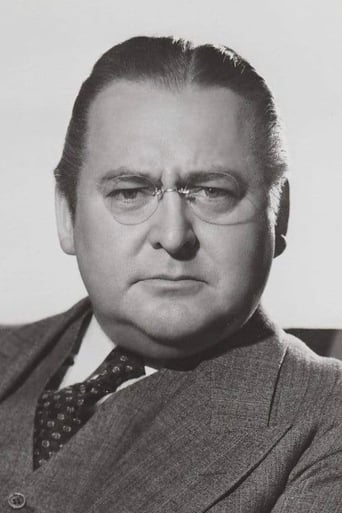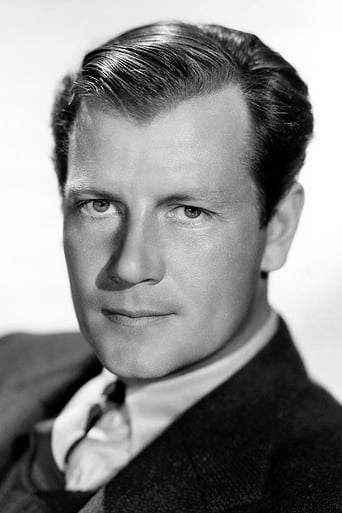CheerupSilver
Very Cool!!!
MusicChat
It's complicated... I really like the directing, acting and writing but, there are issues with the way it's shot that I just can't deny. As much as I love the storytelling and the fantastic performance but, there are also certain scenes that didn't need to exist.
Mandeep Tyson
The acting in this movie is really good.
Zandra
The movie turns out to be a little better than the average. Starting from a romantic formula often seen in the cinema, it ends in the most predictable (and somewhat bland) way.
tomsview
"Come and Get It" has an unusual story and seems ahead of its time in taking a stance about the environment. It is also a chance to see Francis Farmer at her best in the only one of her movies she actually liked. Proving that blondes don't always have more fun, Francis Farmer had more drama off-screen than any character she ever played on-screen. But as "Come and Get It" reveals, she projected a strong presence and possessed beauty that would have attracted attention in any decade of cinema. Star of the film was Edward Arnold who plays entrepreneurial lumberman, Barney Glasgow, over a period of twenty years, from age thirty to fifty. Unfortunately Arnold had the sex appeal that one would expect from a balding, thick-waisted and double-chinned man of 46 – his real age. For him to convincingly play a virile thirty-year old was quite a stretch.Set in Wisconsin in 1884, Barney takes a shipment of lumber to the sawmill in Iron Ridge with the help of his friend Swan Bostrom. Walter Brennan plays Swan. Unlike Edward Arnold who always looked middle-aged, Walter Brennan always looked old. Here he looks positively ancient, despite the fact that he was only 42 at the time. The boys meet Lotta Morgan, played by Francis Farmer, the resident chanteuse at a nearby saloon. Her portrayal of Lotta, especially in her early scenes is bizarre. Chewing gum and talking out of the side of her mouth, she sings two versions of the same song. Francis Farmer had a surprisingly deep voice and the song is so slow and dirge-like that she sounds like an old Gramophone record playing at the wrong speed. Fortunately her performance becomes less affected as the film progresses.Barney and Swan fall for Lotta but she falls for Barney – thick waist and multiple chins notwithstanding. However, Barney is already engaged to the daughter of a powerful timber tycoon, Emma Louise Hewitt played by Mary Nash. Barney leaves to marry Emma, an act that will cement a financial partnership with her father, leaving Swan to break the news to Lotta. She is hurt but now also unemployed. Swan offers to marry her. Lotta accepts although Swan looks old enough to be her grandfather.Twenty years later, Barney now owns a huge paper mill, and has a son Richard, played by a youthful Joel McCrea. Barney accepts an invitation from Swan to visit him in Iron Ridge. We learn that although Lotta died some time before, Swan has a daughter who is the spitting image of her mother, also named Lotta. Francis Farmer plays both roles, bearing out an enduring Hollywood maxim that the grown-up child of a parent who dies earlier in the film should be played by the same actor. Barney falls for Lotta Bostrom, and tries to recapture the feelings he had for the mother through the daughter. Barney is ardent in his pursuit of her while Swan seems amazingly accepting of Barney's inappropriate advances towards his daughter. After Barney convinces Swan and Lotta to accompany him back to the city, she falls in love with Richard Glasgow, Barney's son. Events come to a head when Barney catches Richard with Lotta. Eventually Barney receives the long-delayed reality check he needs to bring him to his senses.Although "Come and Get It" doesn't quite fit into the mainstream of Hollywood films of the 30's, it holds up much better than most of them, and offers a rare glimpse of an intriguing and ill-fated star.
rixrex
This is one of the best Hollywood productions of the 1930s and, in my opinion, of the 40s and 50s as well, when so many dramatic films were either overly cynical (40s) or too syrupy (50s).Superb acting by leads who are believable people and not 'pretty boys'. A fine dramatic story that has the right pacing and the right dialog, and a wholly believable ending.It is something I'd have expected from the great filmmakers of France or Italy during this period, such as Renoir, but not from Hollywood.The kind of film that gets better with each viewing and as time passes.Definitely one to look for if you have not yet seen it!
Robert J. Maxwell
There was co-director but this sure looks like Howard Hawks. For one thing, there's Frances Farmer, Hawks' type of woman -- young, beautiful, throaty. For another, it's almost a rough draft of "Red River". An ambitious man leaves the woman who loves him. The woman dies in his absence. Years later, he and his son meet another woman who reminds the father figure of the girl he once lost. The son falls in love with her. Conflict ensues between the two men, with the father provoking a physical fight with the younger man. The older man realizes that he's been foolish and the son winds up with the girl. (I think it was Robin Wood who first pointed out these parallels.) And that climactic scene -- with the father (Edward Arnold) slapping his son (Joel McRea) -- appears not just in "Come and Get It" and "Red River" but, in altered form, in Hawks' "Billy the Kid." Anyway, Arnold is the hearty, blustering man of business who slips sideways into a marriage de convenance, leaving Frances Farmer behind. She's good looking enough and might have been a decent actress if she hadn't been mentally ill.Good scenes of cutting timber and processing the logs into sheets of wood. Good depiction of stubborn robber baron mentality too -- Arnold bellows cheerfully, "Why by the time I'm done there won't be ten cents worth of timber left." Joel McRea is a stubborn kid who invents the paper cup and who has notions about replanting the forest, both of which Arnold believes to be nonsense. Florence Kluckhohn, the anthropologist, suggested humans have three ways of relating to nature: conquer it, live in harmony with it, or be subjugated to it. For Arnold's rabid capitalist, it's always "Vici, vici, vici." He rails against Teddy Roosevelt and his trust busters. It wasn't that way in the old days when you could shave an entire ecosystem down to stubble. Why can't they leave a man alone to do things the way they've always been done. An appealing sentiment. Well, it must be appealing because it appears so often in advertisements and commercials. "Never had it. Never will." It's kind of an interesting thread that is only brought in a few times and then discarded.What the script lacks in social comment -- something that never interested Howard Hawks anyway -- it makes up for in its examination of the psychodynamics of Edward Arnold. He begins as a greedy devil-may-care hard working poor guy. His fling with Frances Farmer is nothing more than that to him. But after he leaves and she dies, he finds himself in a companionate marriage that doesn't satisfy him. His old friend (Walter Brennan) had married Farmer and they'd had a daughter. When Arnold visits his old friend again, the first time in twenty years, he is struck by Brennan's daughter who looks exactly like Frances Farmer -- and in fact IS Farmer in a dual role.Arnold is now rich and powerful but he's fifty years old, more than twice the age of Brennan's daughter. Well, as they say, there is no fool like a fool who has had twenty years to get used to having everything he's ever wanted -- and he wants Farmer. It doesn't do him any good. He showers her with gifts and finally proposes that they set up in a Chicago apartment where no one will know what's going on. She's repulsed, of course, and he comes to his senses.It's difficult for all of us to finally come to our senses, and the last shot of Edward Arnold ringing the huge triangle at his mansion, calling everyone to dinner, and braying, "Come and get it!", with his eyes filled with tears, is a tragic one. He's one of those people who made the wrong choice years ago, just like the rest of us.
Neil Doyle
Edna Ferber's timberland drama gives top billing to EDWARD ARNOLD over JOEL McCREA and FRANCES FARMER--but it's Farmer who impresses the most with her dual role, despite scene-stealing tactics from WALTER BRENNAN with a Swedish accent in an Oscar-winning supporting role as Arnold's simple-minded friend.EDWARD ARNOLD seems strangely miscast as the lumberman with designs on a much younger woman. His relationship with FRANCES FARMER and her immediate attraction to him seems highly improbable, despite the fact that he can give her wealth and security. A more attractive mature leading man as the two-fisted lumberjack would have served the romantic angle of the drama more believably.Arnold has ambitions to be the richest timberland boss in Wisconsin. The film begins with a series of energetic and visually exciting scenes of timber falling in the forests as the lumbermen go about their vigorous work details. It's an almost documentary approach that gives the story that follows great authenticity, although it's a typically plot-heavy Edna Ferber tale of two generations.In Wisconsin of the 1800s, Farmer is a saloon gal, Lotta, impressed by Arnold's wealth and improbably falls in love with him. When he runs off to marry a society girl, Farmer turns even more improbably to Walter Brennan as her husband.Twenty years later, Arnold is a rich man with a wife (MARY NASH) and two children (JOEL McCREA and ANDREA LEEDS). He goes back to visit Brennan and meets his daughter--FRANCES FARMER in a more demure role is the spitting image of her mother, who has died, and her name is Lotta too. She's a sweeter, more refined version of her mother. The plot thickens, in true Ferber style, with Arnold now intent on wooing Brennan's daughter.Farmer's beauty is reminiscent of Madeleine Carroll's type of blonde loveliness with sculptured cheekbones and fine facial features. JOEL McCREA is rather wasted in what is little more than a supporting role as Arnold's business man son, instantly attracted to Farmer and then realizing so is his father.Summing up: An oddly interesting tale despite some improbabilities in the story line. Probably the film that best showcases Frances Farmer, the film was co-directed by Howard Hawks and William Wyler.




